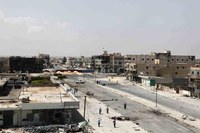Three detainees die in Misrata; UN Mission expresses concern at suspected torture
The detainees died on 13 April in the Zaroug detention centre, which is controlled by a committee under the supervision of the new Libyan Ministry of Interior.
The Tripoli Post reported at the end of April that the Ministry of Interior had absorbed 70 000 former rebels turned revolutionaries. who helped oust the former dictatorial regime of Muammar Gaddafi from power.
Detainees in detention facilities are mostly alleged sympathisers of, or alleged mercenaries for, the former regime.
UNSMIL said in a statement it had taken note of at least seven other cases of toture in the same detention facility. Allegations of torture and ill-treatment of detainees held by armed brigades in other detention centres, particularly in the capital, Tripoli, and in the towns of Zawiya, Zintan and Misrata, were noted.
UNSMIL voiced further concern over the reported existence of some secret detention facilities run by the "brigades" where detainees are at risk of torture, and urged the Libyan Government to take immediate and concrete measures to address the situation, including conducting thorough investigations and bringing those responsible to justice.
An effective internal inspection mechanism covering all places where people are deprived of their liberty should also be established, UNSMIL said.
UNSMIL welcomed a statement by the Supreme Security Committee of Misrata condemning the abuses and voicing support for investigations and appropriate legal action, and said it recognized the difficulties the Libyan Government faces in transferring responsibility for detainees to the proper State authorities.
"UNSMIL acknowledges that progress, albeit slow, has been made in this regard," it said in a statement "Nevertheless, with a view to the absolute prohibition of torture under international law, UNSMIL calls upon the Government to make addressing these allegations and practices a top priority in pursuit of a new culture of respect for human rights and the rule of law in post-revolution Libya."
The Tripoli Post reported that on 2 May 2012 Libya's ruling National Transitional Council passed a number of laws criminalising the glorification of the dead dictator Muammar Gaddafi, his regime and his sons. According to the law, Libya is still in a state of war following the 2011 conflict.
"In conditions of war, there is a prison sentence for any person who spreads information and rumors which disrupt military preparations for the defense of the country, spread terror or weaken the citizens' morale," said Libya’s chairman of the National Transitional Council, Mustafa Abdel Jalil.
A second law, also governing the transition, stipulates prison sentences for anyone who "attacks the February 17 revolution, denigrates Islam, the authority of the state or its institutions."
A third law was also issued which confiscates all property and funds belonging to figures of the previous regime, including Gaddafi’s relatives, putting them under the care of the judiciary.

